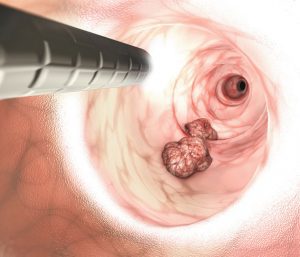 Getting a colonoscopy is typically not on the top of most men and women’s to do list. However, knowing the risks that come with delaying cancer screenings such as a colonoscopy is vital to keeping yourself healthy. March is National Colorectal Cancer Awareness month to remind those that still may need to schedule their colonoscopy. It is crucial to get checked because colorectal cancer is the second leading cause of cancer deaths in the United States.
Getting a colonoscopy is typically not on the top of most men and women’s to do list. However, knowing the risks that come with delaying cancer screenings such as a colonoscopy is vital to keeping yourself healthy. March is National Colorectal Cancer Awareness month to remind those that still may need to schedule their colonoscopy. It is crucial to get checked because colorectal cancer is the second leading cause of cancer deaths in the United States.
Fortunately, colon cancer is generally preventable through colonoscopy screenings. Yet, many adults are past due for screenings due to the fear of COVID-19 has brought to the healthcare industry. Several common digestive conditions can be caused by problems in the colon or rectum. These issues range from functional disorders to structural disorders, which can affect bowel movements and cause pain, discomfort and bleeding.
With the rising number of younger adults being diagnosed with colorectal cancers, including many with no family history of the disease, now, more than ever digestive health teams are encouraging patients to not delay their colon care. At Physicians Regional, our colorectal surgeons work closely with gastroenterologists and other specialists to provide supportive care for all colorectal conditions. Dr. Susan Cera, Board Certified Colorectal Surgeon at Physicians Regional Medical Group, urges patients to schedule their regular colonoscopies.
“Many individuals think that if they don’t have symptoms and they don’t have family history of colon cancer, then they won’t develop colon cancer,” says Dr. Cera. “However, colon cancer is the third most common cancer in both men and women, and 80% of the time it develops in people who don’t have a family history.”
While scheduling a procedure as serious as a colonoscopy can be nerve-racking, Dr. Cera ensures that the technology in today’s healthcare system is more advanced than ever. “Colonoscopies now have high definition capability, just like your TV at home, and allows for improved visualization of smaller polyps and lesions that can predispose to colon cancer.”
Colon cancers are being diagnosed and treated at earlier stages due to the cancer being detected before symptoms even arise. If you have experience the following symptoms, seek medical help from your physician as soon as possible.
• Rectal bleeding
• Change in stool color
• Change in bowel habits
• Pain or cramps
• Iron deficiency anemia
In addition to colonoscopy, there is a new screening tool in our arsenal for the battle against colon cancer. It’s a test called Cologuard that detects blood and abnormal cells in the stool. It’s very effective in detecting cancer after cancer has already formed. It can also detect some pre-cancerous polyps. However, the best method of prevention (avoiding colon cancer altogether) still remains colonoscopy to remove pre-cancerous polyps before they become cancer. Current guidelines recommend that a Cologuard be done every three years in addition to colonoscopies at regular intervals.
More than 600,000 colorectal surgeries are preformed across the U.S. each year. Surgeons at Physicians Regional Medical Group use minimally invasive surgical techniques whenever possible. These procedures include laparoscopic and robotic surgery, which typically offer smaller incisions and scars, less pain and can lead to faster recovery than traditional, open approach surgery.
Follow Dr. Cera’s healthy gut tips to help minimize the risk of developing colorectal cancer:
• Minimize alcohol and avoid smoking.
• Maintain a healthy weight and active lifestyle.
• Know your family history and discuss the optimal screening test with your doctor.
• Maintain a high-fiber (30 g of fiber daily), low-fat (30% or less of total calories are from fat) diet.
• Include plenty of fruits, vegetables, and whole grains into your diet.
Dr. Cera’s office is located in Naples at
Physicians Regional – Pine Ridge,
6101 Pine Ridge Rd.
For more information or to schedule an appointment, please call 239-348-4128, or schedule online at physciansregionalmedicalgroup.com









